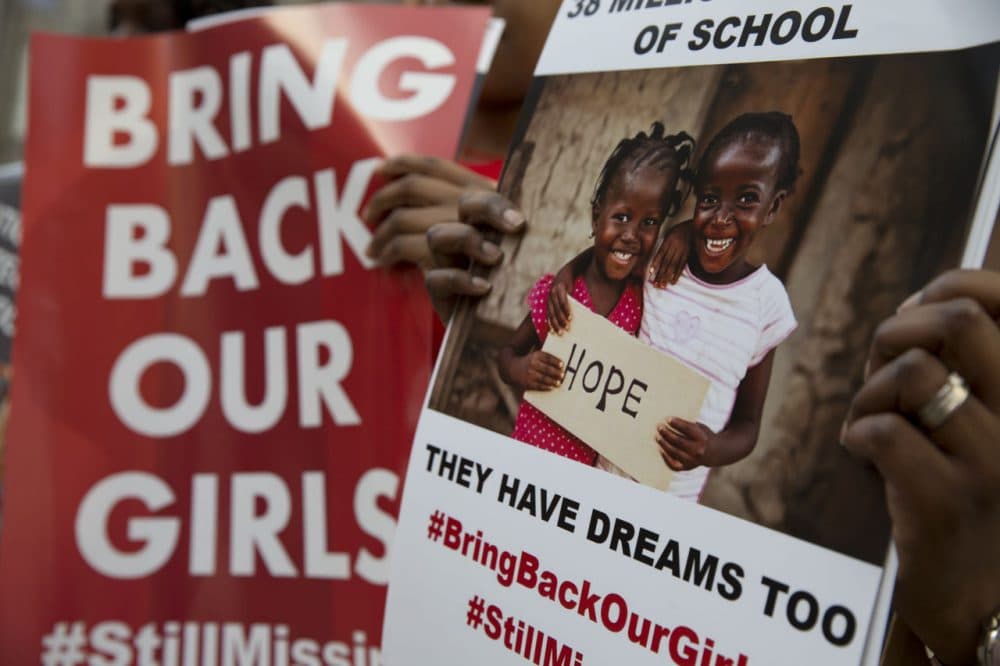Advertisement
One Year Later, Nigerians In Boston Mark Anniversary Of Kidnapped Schoolgirls

As Boston marks two years since the marathon bombing, a group of local Nigerians is trying to raise awareness about another act of terror.
It's been one year since 276 schoolgirls were kidnapped by terrorist group Boko Haram from their boarding school dormitories in Chibok, a town in northeastern Nigeria. Some of the girls were able to escape, but 219 are still missing. Nigerians here plan to gather at 5 p.m. Wednesday on the Boston Common for a candlelight vigil to mark the anniversary and to raise awareness about the fact the girls have not been rescued.
"It's an honor we owe them," said Godwin Nnanna, an organizer of the event. "I think for us in Boston, it’s very symbolic … because this city for all it represents, it’s the educational hub of the world. Thousands of people from all across the world come to this place to seek knowledge and go to school and these girls [were] going to school with the hope that perhaps one day some of them might come here to be at Harvard or MIT or one of these colleges. But somebody cut that dream short."
Wednesday's vigil is being organized by various groups, including the Nigerian American Multi-Service Association (NAMSA), an umbrella organization for various local Nigerian groups, as well as Nigerian students at Harvard, MIT and Boston University. NAMSA organized rallies and vigils last year and Nnanna, who helped organize an event on the Common last year, said he hoped he wouldn't have to again this year.
"This is obviously one of those kinds of events you don’t want to organize," he said.
"The Chibok girls are not a hashtag. It’s not a Twitter frenzy. It’s about lives."
Godwin Nnanna
Organizers say they're disappointed the Nigerian government has failed to find the girls and the international community seems to have moved on.
Nnanna said he hopes the Boston Common event sends the message that the girls have not been forgotten.
"It will be a big indictment on the entire world, if the world just carries on as if nothing happened," he said.
In the weeks following the mass kidnapping last April, the Twitter campaign #BringBackOurGirls went viral and sparked international outcry, with everyone from Michelle Obama, Hillary Clinton, activist Malala Yousefzai and other celebrities chiming in on the cause.
But organizers of the vigil in Boston say after one year, there needs to be more action.
"The Chibok girls are not a hashtag," Nnanna said. "It’s not a Twitter frenzy. It’s about lives."
Advertisement
Organizers hope to keep the pressure on the Nigerian government and international community to take tangible steps to rescue the missing girls. Nnanna said the group also hopes to draw attention to the growing global threat of terrorism. He said the timing of the marathon bombing anniversary and the anniversary of the mass kidnapping shows how terrorism "has become such a cancer that must not be left for one country to fight, but the whole world must rise against it."
The recent terrorist attack on a university in Kenya, which left 147 people dead at the hands of Somali-based terror group al-Shabab, is also on the the minds of people in Boston.
Members of the Kenyan community in the Boston area also plan to be on the Common Wednesday.
"We thought we could combine our forces and come and show our resolve to fighting against terrorism," said Harrison Maina, the executive director of the New England Kenya Welfare Association, an organization that works to connect Kenyans across the region.
Maina said the local activists want the governments in Kenya and Nigeria to "step up security measures because people's lives are important."
And in Nigeria itself, activists there have also been working to keep up momentum on finding the girls, as NPR reports:
Each day, #BringBackOurGirls campaigners wearing their trademark red gather at Unity Fountain in Nigeria's capital city of Abuja.
"Solidarity forever, solidarity forever, we shall always fight for our girls," they chant. "All we are saying is bring back our girls now and alive!"
It was Nigerians who first took to Twitter to create the #BringBackOurGirls campaign and, with the recent election of a new president, they will be watching closely to see if Muhammadu Buhari, a former military general who takes office May 29, will be able to take out Boko Haram and bring the girls back.
Nigerians here in Boston will also be watching Buhari closely.
"We are hoping that he will be serious about rescuing these girls ... because that’s what he campaigned on and [he will be held] accountable," Nnanna said. "If there’s one thing the election in Nigeria this year said it is that Nigerians are no longer comfortable with empty promises."
Nnanna said members of the local Nigerian community plan to continue the movement and collaborate with groups in other cities.
